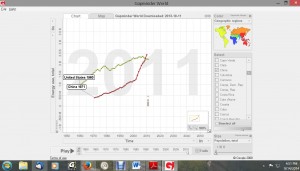1. What types of policies on the part of government could promote energy efficiency?
The government has a prime role to promote a policy which would drive the economy towards energy efficiency and sustainability. Businesses which are functioning within their proper niche would have no reason to promote or create energy efficient products unless a large changed needed to be made. It is only through a combination of major policy changes, and consumer demand that businesses will make a transition towards more efficient products.
For example:
- Residential buildings REQUIRE certain amounts of insulation throughout the home (policy change) AND homeowners like to be warm and save money on heating during the winter (demand). Therefore businesses such as CertainTeed are doing well selling insulation.
- To the contrary, limited to my locality, there has not been a demand of strictly electric cars. Although there are tax breaks (policy change), finding a charging station would be a major inconvenience as the closest one is about 40 miles away (lack of demand).
Finally one of the coolest things that the government is doing is promoting low energy and sustainable building policies. Look at the Department of Energy’s Race to Zero. The program itself was designed to:
- Inspire and develop the next generation of building science professionals.
- Advance and enhance building science curriculum in universities.
- Complement the experiential learning benefits provided by the DOE Solar Decathlon through an additional collegiate competition opportunity.
- http://www.energy.gov/eere/buildings/us-department-energy-race-zero-student-design-competition
2. How would you develop a business that has the potential to move this idea forward?
I feel that consulting firms will have a giant market in the future. Energy prices will continue to rise and homeowners/ businesses will continue to use more energy in spite of having energy efficient items (see chart below). We are reaching a point that there will be a major demand seeking the knowledge of energy efficiency on both a small and large scale. Through a combination of energy auditing, life-cycle cost analyses, and up to date knowledge of sustainable tax incentives a consulting firm could do quite well.
-Reichart
Rosling, Hans. Gapminder World. Vers. 0.0.7. Stockholm: Http://www.gapminder.org/, n.d. Computer software.
Pacific Northwest National Laboratory & Oak Ridge National Laboratory. “BUILDERS CHALLENGE GUIDE TO 40% Whole-House Energy Savings in the Cold and Very Cold Climates.” BUILDING TECHNOLOGIES PROGRAM (n.d.): n. pag. Feb. 2011. Web.
“Residential Buildings Integration.” Residential Buildings Integration. Energy.gov, n.d. Web. 14 Sept. 2014.
